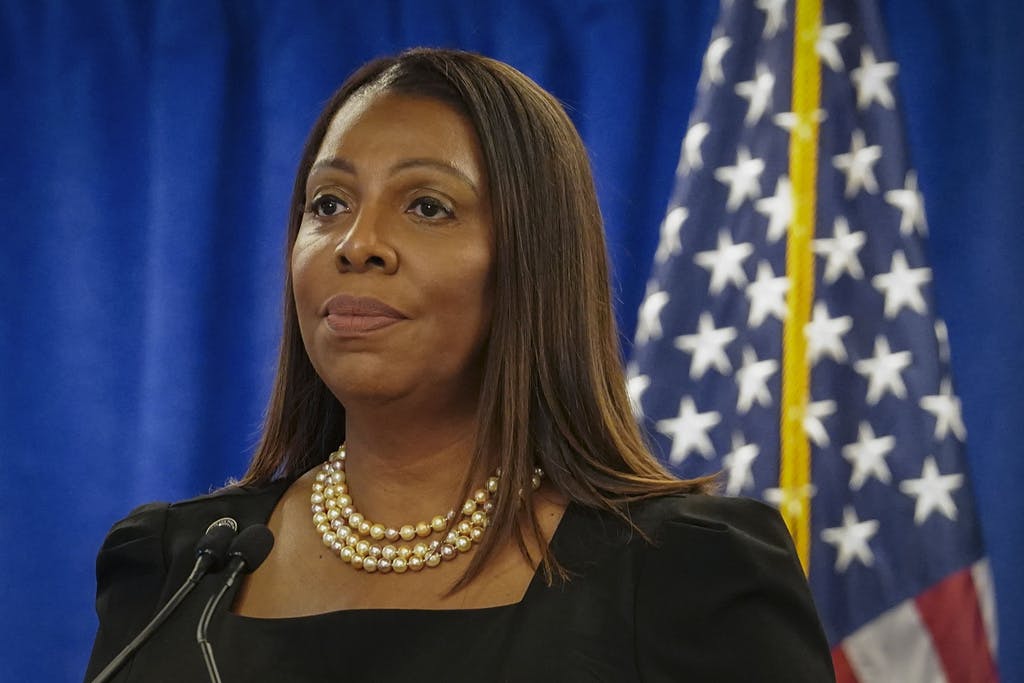‘Free Speech for Me but Not for Thee’ as Firefighters and a Biden Critic Face Censorship for Dissenting
It may be rude to boo a guest speaker, but rude boos are as protected by the first amendment as polite claps. In America, we do not hunt down dissenters. We protect their right to dissent.

Two recent episodes illustrate the selective denial of free speech to anti-government dissenters, including New York City firefighters who booed Attorney General Letitia James, and a Biden critic who got ejected from the State of the Union for fact-checking the president.
During the State of the Union, talk show host Sidney Rosenberg shouted two words at President Biden. After Mr. Biden overstated the number of civilian casualties in Gaza, Mr. Rosenberg asked, “Says who?” This question is as American as apple pie and was typical of the place where both Mr. Rosenberg and I grew up — Brooklyn. Whenever people made outrageous statements, our response was “Says who.”
Congressional officials removed Mr. Rosenberg, claiming that he had violated the rules governing the State of the Union address. In other words, he was censored. Although he was not arrested, he was punished by not allowing him to remain for the duration of the address.
Mr. Rosenberg did not seek to disrupt Mr. Biden’s speech, as radical leftists frequently do disrupt pro-Israel speeches, including some of my own. Their goal is to prevent the speaker from expressing First Amendment-protected views and to prevent the audience from hearing them.
Mr. Rosenberg’s goal was to show skepticism at Mr. Biden’s easy acceptance of Hamas-generated false casualty figures.
It might be constitutional for Congress to prevent all audience displays of approval or disapproval. Courts do that. The State of the Union, though, is filled with applause. Any government function that permits applause or other shows of agreement must also permit brief boing or other displays of disagreement.
No government agency can pick or choose the content of what is permitted. The First Amendment does not allow the government to prefer sounds of approval over sounds of disapproval.
Accordingly, removing Mr. Rosenberg for asking his two-word question violated both his constitutional rights and the rights of those who might ask similar questions or express similar views.
Had Mr. Rosenberg or anyone else persisted in shouting to the point of preventing the president from continuing with his remarks, removal would have been proper, but Mr. Rosenberg’s removal was not.
A similar situation occurred when the New York Attorney General addressed firefighters. Most in the audience applauded but some booed. Fire Department officials have threatened to “hunt down“ and presumably punish the dissenting firefighters. This, too, is an unconstitutional attempt by government officials to chill and censor dissent.
It may be rude to boo a guest speaker, but rude boos are as protected by the first amendment as polite claps. In America, we do not hunt down dissenters. We protect their right to dissent.
Both the State of the Union and a speech by a controversial elected attorney general are political events governed by the speech rules applicable to such events, not to rules governing court proceedings.
Even a judge, though, could not instruct courtroom attendees that they can clap in approval of a verdict but cannot show disapproval. Content neutrality is the rule governing all governmental restrictions on expression.
So in both cases, government officials acted unconstitutionally. Can they be sued to prevent recurrences of such censorial actions? I think they probably can, because both Mr. Rosenberg and the firefighters would have standing to sue their censors.
Congressional officials might claim that under the Constitution Congress has the sole power to create rules governing decorum. That is true, but they have no power to violate the First Amendment by favoring claps over boos, or favorable comments over unfavorable ones. The same is true of the fire department.
Mr. Rosenberg and the firefighters might have difficulty proving specific monetary damages, but money would not be the purpose of a lawsuit. It would be to establish binding precedents prohibiting selective censorship of views critical of government officials.
We live in an age where both sides seem to believe in “free speech for me but not for thee.” Selective censorship for partisan purposes seems to be the rule rather than the exception.
It would benefit all Americans if the courts were once again to emphasize that selective censorship based on partisan considerations is never acceptable under the First Amendment.
That message would be powerfully sent if the courts were to rule that Mr. Rosenberg was improperly censored for shouting “says who,” and that the firefighters were unconstitutionally threatened for booing the attorney general.

